

I was 21, living in Havana during the third year of a Hispanic Studies and English Lit Degree, when I took these photos. I don't think I knew anything about the kind of work I was trying to make, other than, having begun to learn the craft of analogue photography about 10 years previously, and seeing in travel a prospect to see both different things, and see them differently, I would set out to 'document' my time in Cuba. I had almost no photographic culture, other than a book of Snowden portraits, a W Eugene Smith book I'd forgotten to return to a teacher, and, I think, a Salgado book, who was recommended to me by a fellow pilgrim walking to Santiago 3 years before. Not being who I was then, and not living in the same world, I can't really imagine taking them, certainly not knowing what I do; but although, or even because that past and self are estranged, and because this was my first intentional project, I'm putting them up here, now. There's more on this here, and alongside the images themselves.
The Malecon was the living room of Havana, public space to look at the horizon, breathe cooler air, think about what changed and what stayed. We walked here at night, drank rum, talked and listened, got hustled and made our first connections. The sea surrounds our dreams, and the 'island teleology' of Cuban imagination, though different for even a long-term visitor, made it feel both far away, and in the middle of everything.
 Show caption
Show caption
The Malecon was the living room of Havana, public space to look at the horizon, breathe cooler air, think about what changed and what stayed. We walked here at night, drank rum, talked and listened, got hustled and made our first connections. The sea surrounds our dreams, and the 'island teleology' of Cuban imagination, though different for even a long-term visitor, made it feel both far away, and in the middle of everything.
Malecon
Wave breaking below the Malecon, the sea wall of La Habana
I'd had to wait to find some fixer to develop the first 6 rolls of film I'd shot, and it wasn't until I met my great friend Michel Pou, asking if he was a photographer when I saw the Agfa photo paper box in his bike basket, and he lent me some, that I could go ahead. I trusted a guy I didn't know was over sure of himself to load the film into the steel spirals I wasn't used to using, and he did so badly, losing frames to kinks in the spooling, and to careless ripping of the rolls' ends. When you go out to shoot, you cast into the unknown, so it's good to retain whatever control you can. Only dev your own film, I thought then and teach now.
 Show caption
Show caption
I'd had to wait to find some fixer to develop the first 6 rolls of film I'd shot, and it wasn't until I met my great friend Michel Pou, asking if he was a photographer when I saw the Agfa photo paper box in his bike basket, and he lent me some, that I could go ahead. I trusted a guy I didn't know was over sure of himself to load the film into the steel spirals I wasn't used to using, and he did so badly, losing frames to kinks in the spooling, and to careless ripping of the rolls' ends. When you go out to shoot, you cast into the unknown, so it's good to retain whatever control you can. Only dev your own film, I thought then and teach now.
Fisherman
Fisherman at dusk
One day the bike disappeared from where I'd left it locked by the university. I found out it'd been taken inside for some reason, and tried to reclaim it. I was dressed down by the director of the faculty: as I didn't have the requisite permit, and had bought it a Cuatro Caminos, it had to be stolen, and I was buying stolen goods and supporting the criminal underworld. I was shocked, partly that one couldn't it seemed, just buy a bike, but also that the official positing on property and commerce was at such odds with the way the city seemed so obviously to work. Very few people didn't interact with the black market for one thing or another, however, and the Party line being toed was unlikely to denote an exception in this case. I never saw the rickety Chinese bike again; I bought another one, Russian, which was much worse.
 Show caption
Show caption
One day the bike disappeared from where I'd left it locked by the university. I found out it'd been taken inside for some reason, and tried to reclaim it. I was dressed down by the director of the faculty: as I didn't have the requisite permit, and had bought it a Cuatro Caminos, it had to be stolen, and I was buying stolen goods and supporting the criminal underworld. I was shocked, partly that one couldn't it seemed, just buy a bike, but also that the official positing on property and commerce was at such odds with the way the city seemed so obviously to work. Very few people didn't interact with the black market for one thing or another, however, and the Party line being toed was unlikely to denote an exception in this case. I never saw the rickety Chinese bike again; I bought another one, Russian, which was much worse.
Bicicleta
My bike below Vedado
I'm not sure I've shot like this since, but I would walk around and shoot on the street. I have no other context but this, that they asked me to take the photo, and I leaned into the car window to do so then went on my way. When I came back to the UK after a year in Cuba, I noticed that on occasion I'd unsettle people I spoke to with the directness and familiarity I'd absorbed immersed on those streets. For much of my time there, I used the camera as a shield to hide my inhibition behind, and a diversion from uncertainly and loneliness.
 Show caption
Show caption
I'm not sure I've shot like this since, but I would walk around and shoot on the street. I have no other context but this, that they asked me to take the photo, and I leaned into the car window to do so then went on my way. When I came back to the UK after a year in Cuba, I noticed that on occasion I'd unsettle people I spoke to with the directness and familiarity I'd absorbed immersed on those streets. For much of my time there, I used the camera as a shield to hide my inhibition behind, and a diversion from uncertainly and loneliness.
Untitled
Women in Lada
I'll always associate trailing this guy with overhearing Pedro Abascal holding forth with Renee Pena and some Mexican photographers, who were eating next to us in Chinatown, near where I lived on San Rafael. I'd said I was interested in photography, and he mis-quoted Cartier-Bresson, or I mis-remember his riposte: A mi no me interesa la fotografia, sino la gente. I was suitably chastened, and impressed.
 Show caption
Show caption
I'll always associate trailing this guy with overhearing Pedro Abascal holding forth with Renee Pena and some Mexican photographers, who were eating next to us in Chinatown, near where I lived on San Rafael. I'd said I was interested in photography, and he mis-quoted Cartier-Bresson, or I mis-remember his riposte: A mi no me interesa la fotografia, sino la gente. I was suitably chastened, and impressed.
Untitled
Street magician, Chinatown
This was the most 'street' photo I'd thought I'd taken, was for years a portfolio print, and was one of the images from this time that I showed to people and that got me breaks, with Rhubarb, and then Visual for Business. I liked the moment-ness of it; more than other shots there was an instinctive decision, rather than anticipated poise. And I liked the range of gazes: his, theirs, mine, and yours.
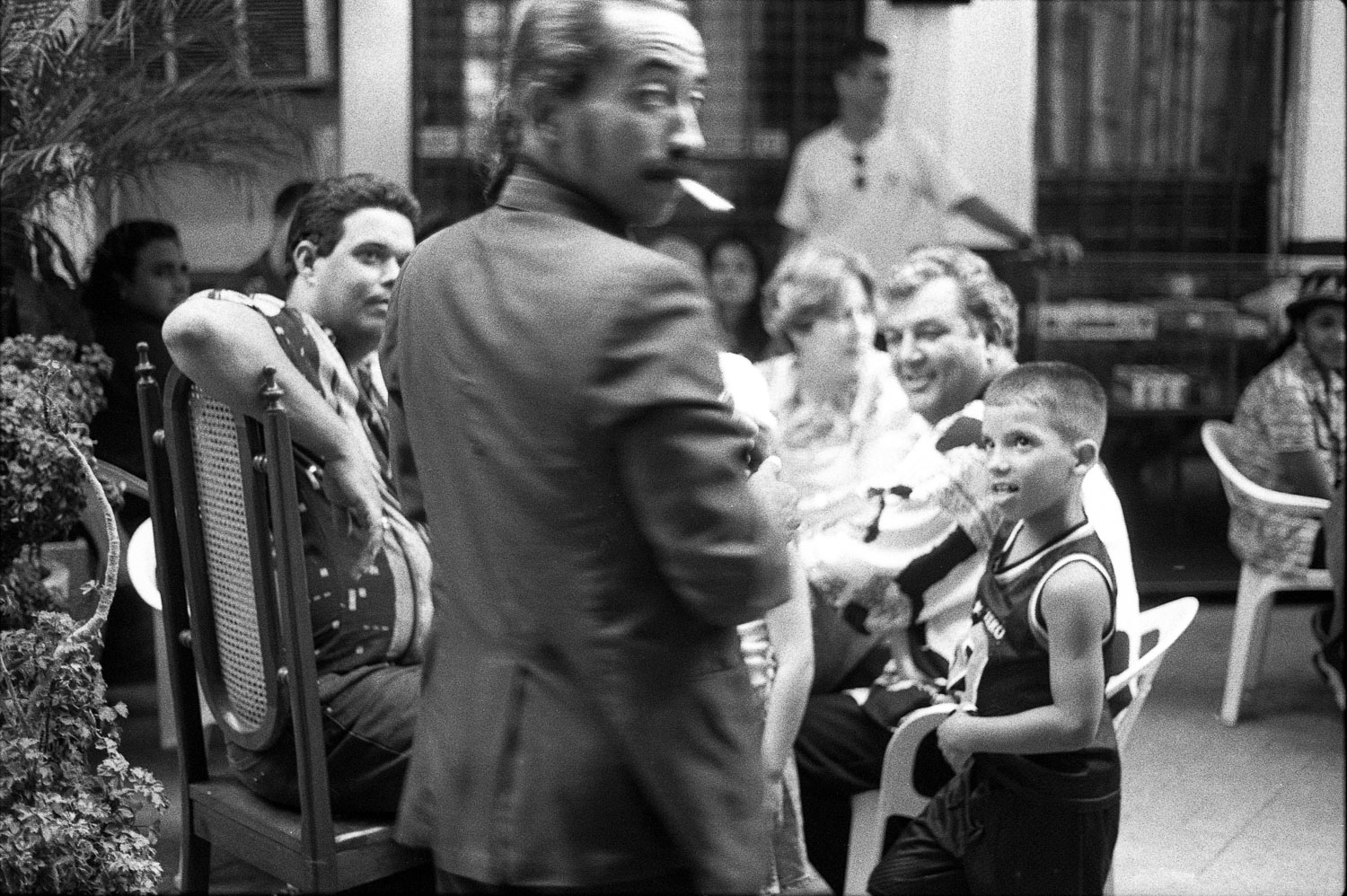 Show caption
Show caption
This was the most 'street' photo I'd thought I'd taken, was for years a portfolio print, and was one of the images from this time that I showed to people and that got me breaks, with Rhubarb, and then Visual for Business. I liked the moment-ness of it; more than other shots there was an instinctive decision, rather than anticipated poise. And I liked the range of gazes: his, theirs, mine, and yours.
Street Magician
+ Buy the print
Chinatown, Havana, 1999
This and the next image came together, a play of focus and frame. We'd waited to get on the waiting list to get a seat to go to Santiago for Christmas. On the way out, there'd been a long stop, seemingly nowhere. I asked why we'd stopped, and was told they were changing the brake pads.
 Show caption
Show caption
This and the next image came together, a play of focus and frame. We'd waited to get on the waiting list to get a seat to go to Santiago for Christmas. On the way out, there'd been a long stop, seemingly nowhere. I asked why we'd stopped, and was told they were changing the brake pads.
Untitled
Santiago to Havana train
Ben told me of a similar stop on the same route: a search for contraband. A man fled into the fields, said to be carrying illegal cheese. From Havana to Sancti Spiritus on a night train, I'd watched the rails curve away through the swinging back dusk door of the last carriage as we rolled into the night. Everyone put all their clothes on as layers against the cold as it darkened; we didn't think to pack for that and shivered all night.
 Show caption
Show caption
Ben told me of a similar stop on the same route: a search for contraband. A man fled into the fields, said to be carrying illegal cheese. From Havana to Sancti Spiritus on a night train, I'd watched the rails curve away through the swinging back dusk door of the last carriage as we rolled into the night. Everyone put all their clothes on as layers against the cold as it darkened; we didn't think to pack for that and shivered all night.
Untitled
Girl on Santiago to Havana train
Walking around Santiago around Christmas 1999, the caretakers of a primary school showed me around when I was photographing something outside. In his wallet he showed me a photo of himself as a younger man, and a boxer. He gave me a plastic Virgin Mary necklace, and showed me a 'Heroes de la Patria' poster in a corridor.
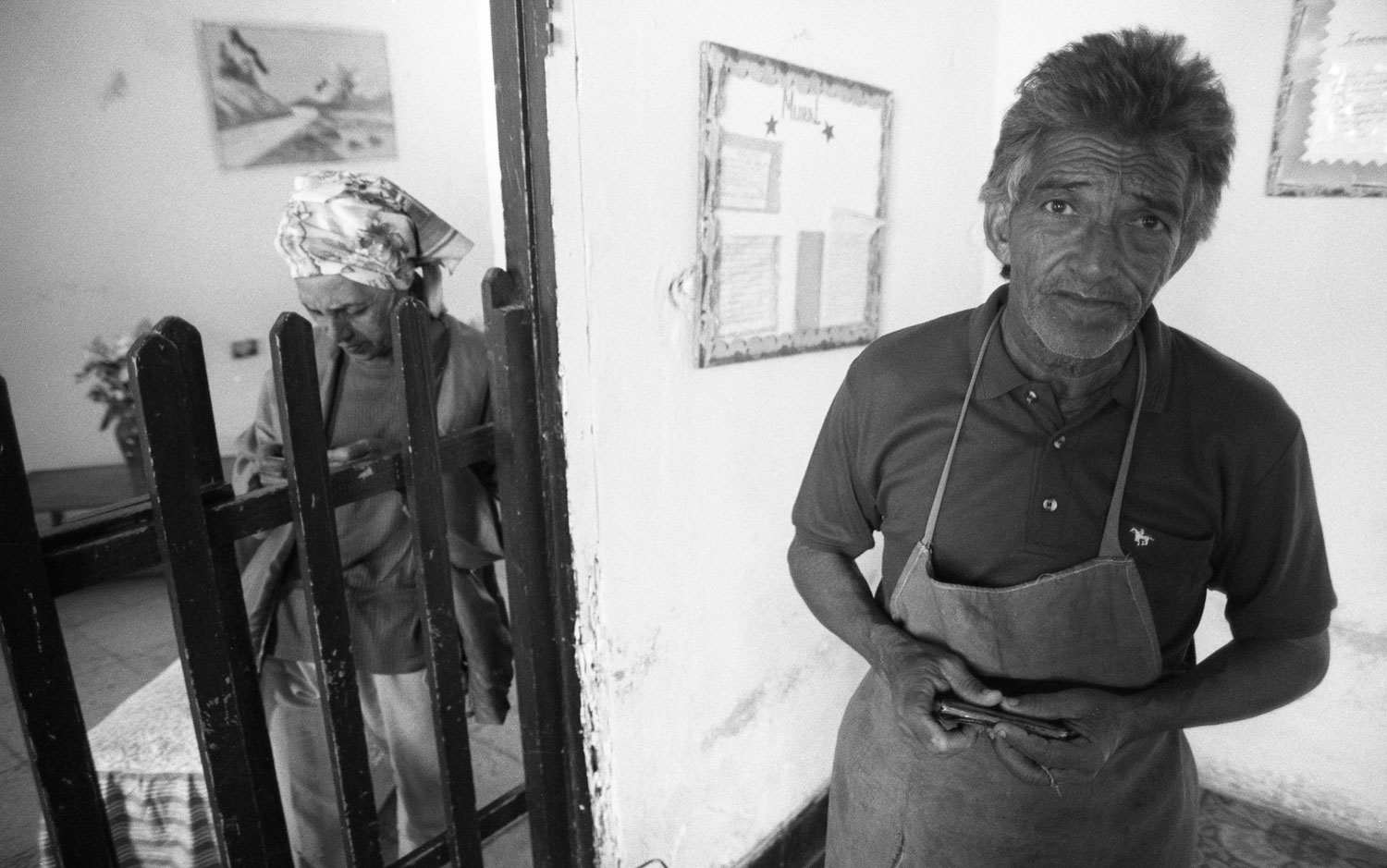 Show caption
Show caption
Walking around Santiago around Christmas 1999, the caretakers of a primary school showed me around when I was photographing something outside. In his wallet he showed me a photo of himself as a younger man, and a boxer. He gave me a plastic Virgin Mary necklace, and showed me a 'Heroes de la Patria' poster in a corridor.
Santiago
School caretakers
My friend Ben lived with this family, on Calle Neptuno, maybe. They were dancers and dance teachers and liked to party.
 Show caption
Show caption
My friend Ben lived with this family, on Calle Neptuno, maybe. They were dancers and dance teachers and liked to party.
Girl
At Jorge's house
Accompanying a group of travelling players - musicians, actors, magicians, comics - I documented their tour of isolated coffee growing communities in the Escambray mountains. They were based in Villa Clara, and the trip was state sponsored, an attempt to counter some of the social issues these new settlements suffered.
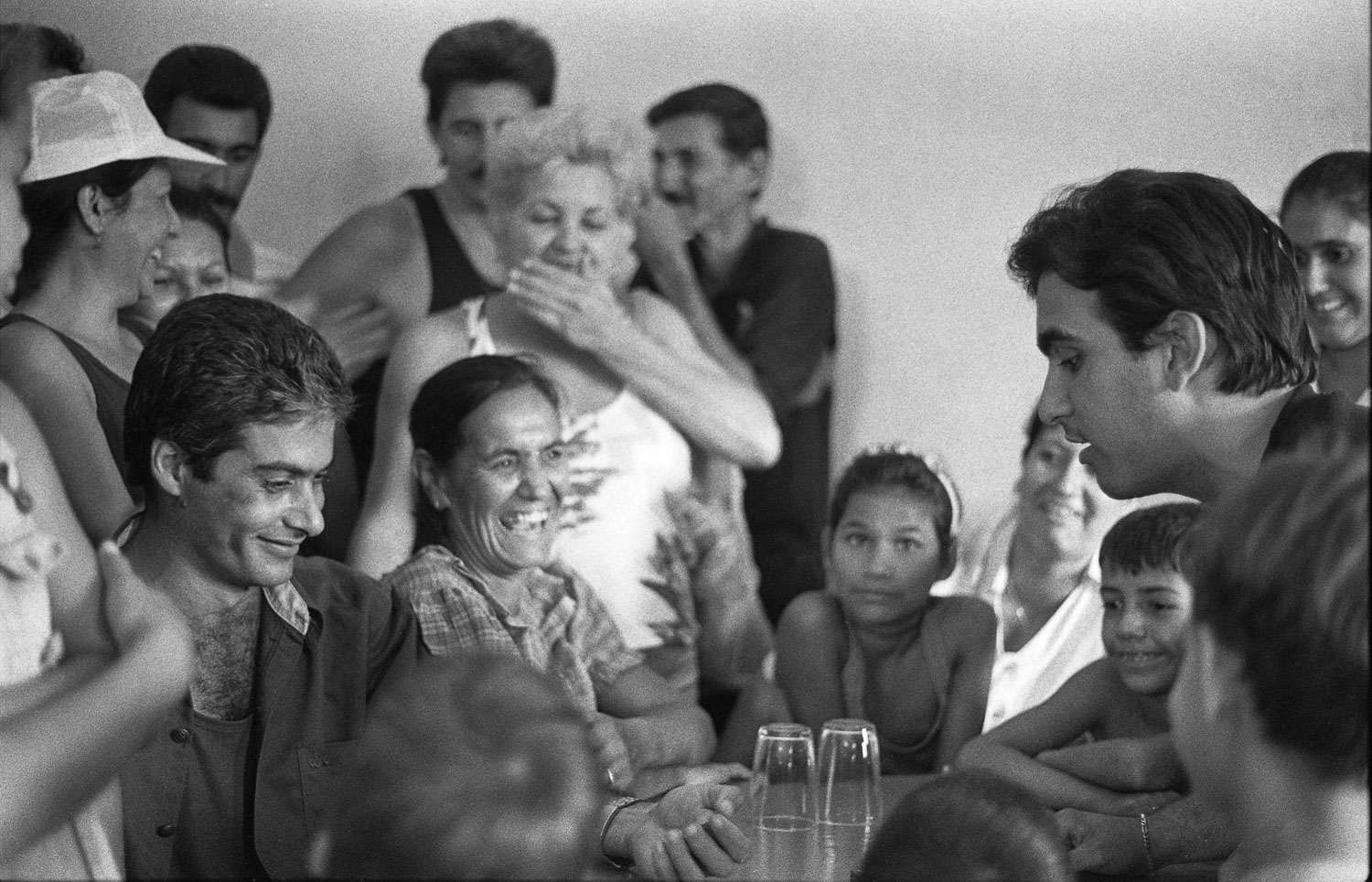 Show caption
Show caption
Accompanying a group of travelling players - musicians, actors, magicians, comics - I documented their tour of isolated coffee growing communities in the Escambray mountains. They were based in Villa Clara, and the trip was state sponsored, an attempt to counter some of the social issues these new settlements suffered.
Travelling Magician
+ Buy the print
Sleight of hand tricks delight onlookers, Escambray mountains, March 2000
We were greeted with wonder and elation by kids, families and grown men alike: it felt like being a medieval troubadour, and I'd never seen so clearly the social value of the arts. We visited a house with mango trees and a waterfall in the back garden, Fidel on the TV, and it seemed like the happy centre of the revolution, truly freedom from rather than freedom to, as the lady explained over the wood stove in her simple kitchen.
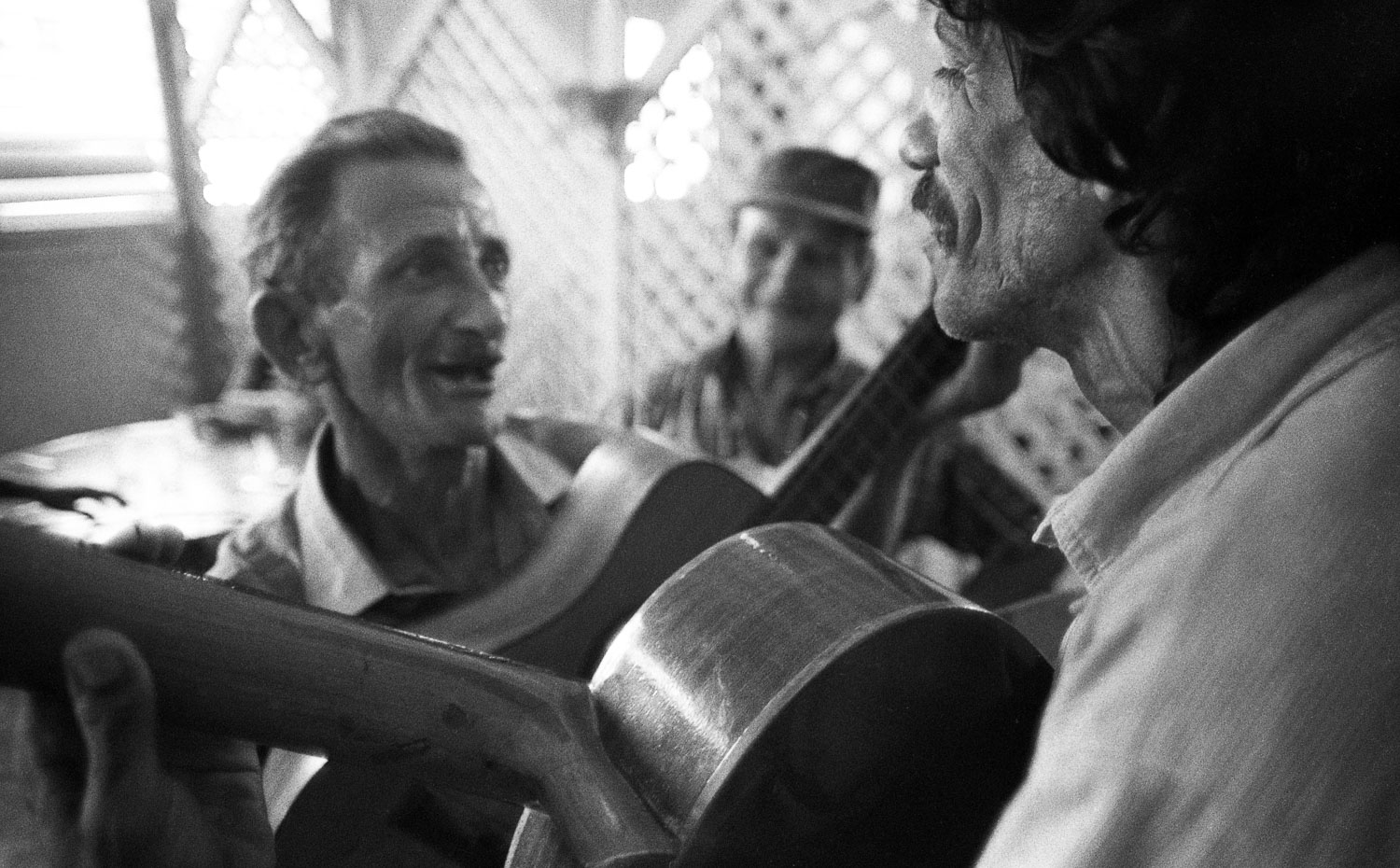 Show caption
Show caption
We were greeted with wonder and elation by kids, families and grown men alike: it felt like being a medieval troubadour, and I'd never seen so clearly the social value of the arts. We visited a house with mango trees and a waterfall in the back garden, Fidel on the TV, and it seemed like the happy centre of the revolution, truly freedom from rather than freedom to, as the lady explained over the wood stove in her simple kitchen.
Guajiros and musician
+ Buy the print
Traditional songs shared in a community hall, Escambray mountains, March 2000
The last show was to be a cinema screening but the projector was broken. I would not have witnessed this without Isabella, my Brazilian friend inviting me to document the trip. I don't know how she got involved but she was an artist also. This is the centre of the island I imagine and remember. We stayed on for a few days, but it was illegal to stay anywhere unlicensed in those days; from being feted, we went to being like fugitives, somehow. I do remember galloping through coffee bushes through the trees, and clattering to a stop in a cloud of dust on a borrowed horse, which sounds like being on the run, but wasn't, it was leisure, fun.
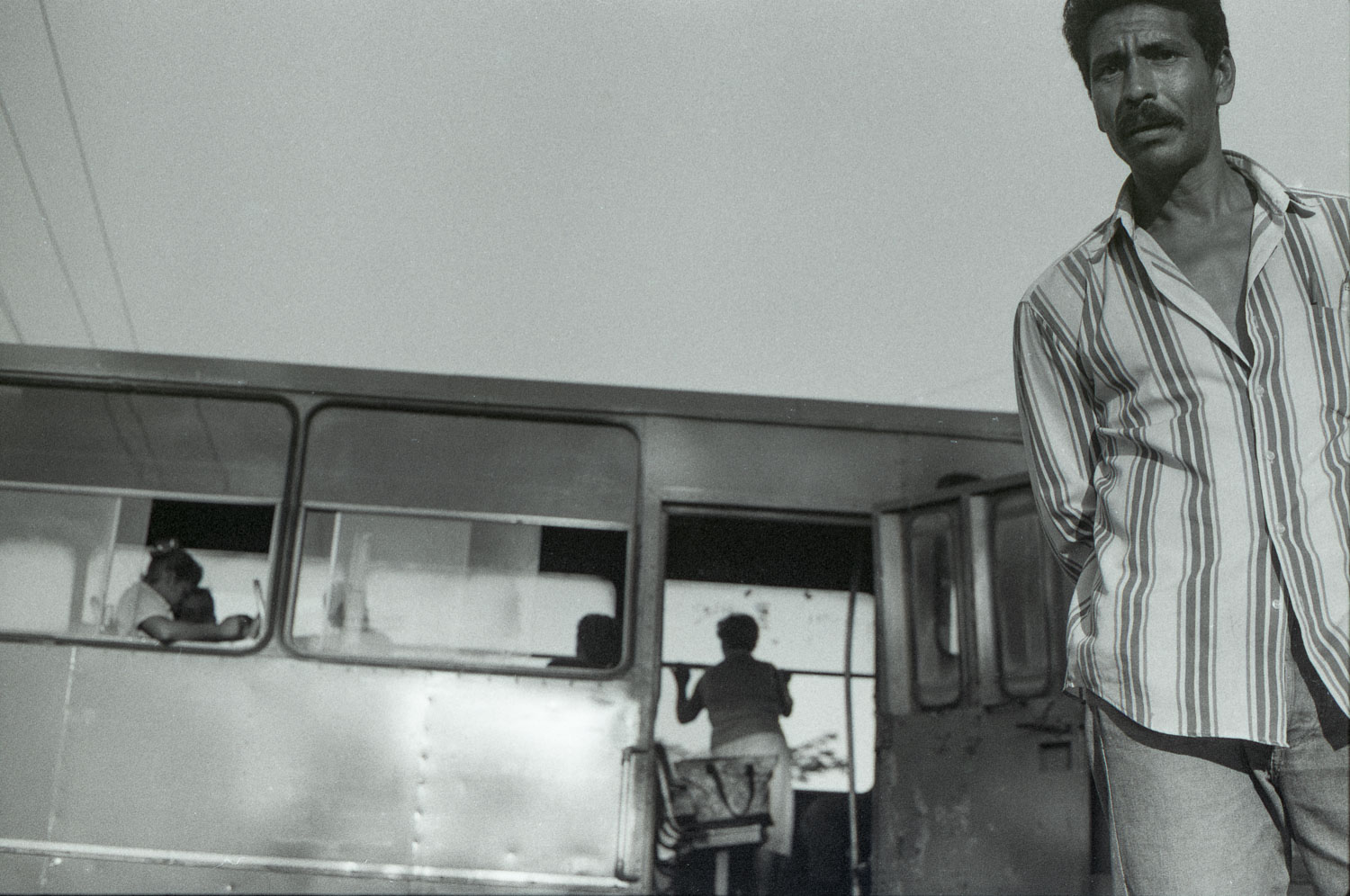 Show caption
Show caption
The last show was to be a cinema screening but the projector was broken. I would not have witnessed this without Isabella, my Brazilian friend inviting me to document the trip. I don't know how she got involved but she was an artist also. This is the centre of the island I imagine and remember. We stayed on for a few days, but it was illegal to stay anywhere unlicensed in those days; from being feted, we went to being like fugitives, somehow. I do remember galloping through coffee bushes through the trees, and clattering to a stop in a cloud of dust on a borrowed horse, which sounds like being on the run, but wasn't, it was leisure, fun.
Bus driver
+ Buy the print
Leaving the Escambray mountains.
I met Eladio Reyes Arias at the Casa del Tango, doing standup: like the eskimo is said to have 30 words for snow, the Cuban has 50 for theft, was one of his jokes. He then listed them, from the hustler 'struggling' on the corner to ministerial misappropriation of funds. He was also a babalao, and invited me to this toque, at the solar where he lived.
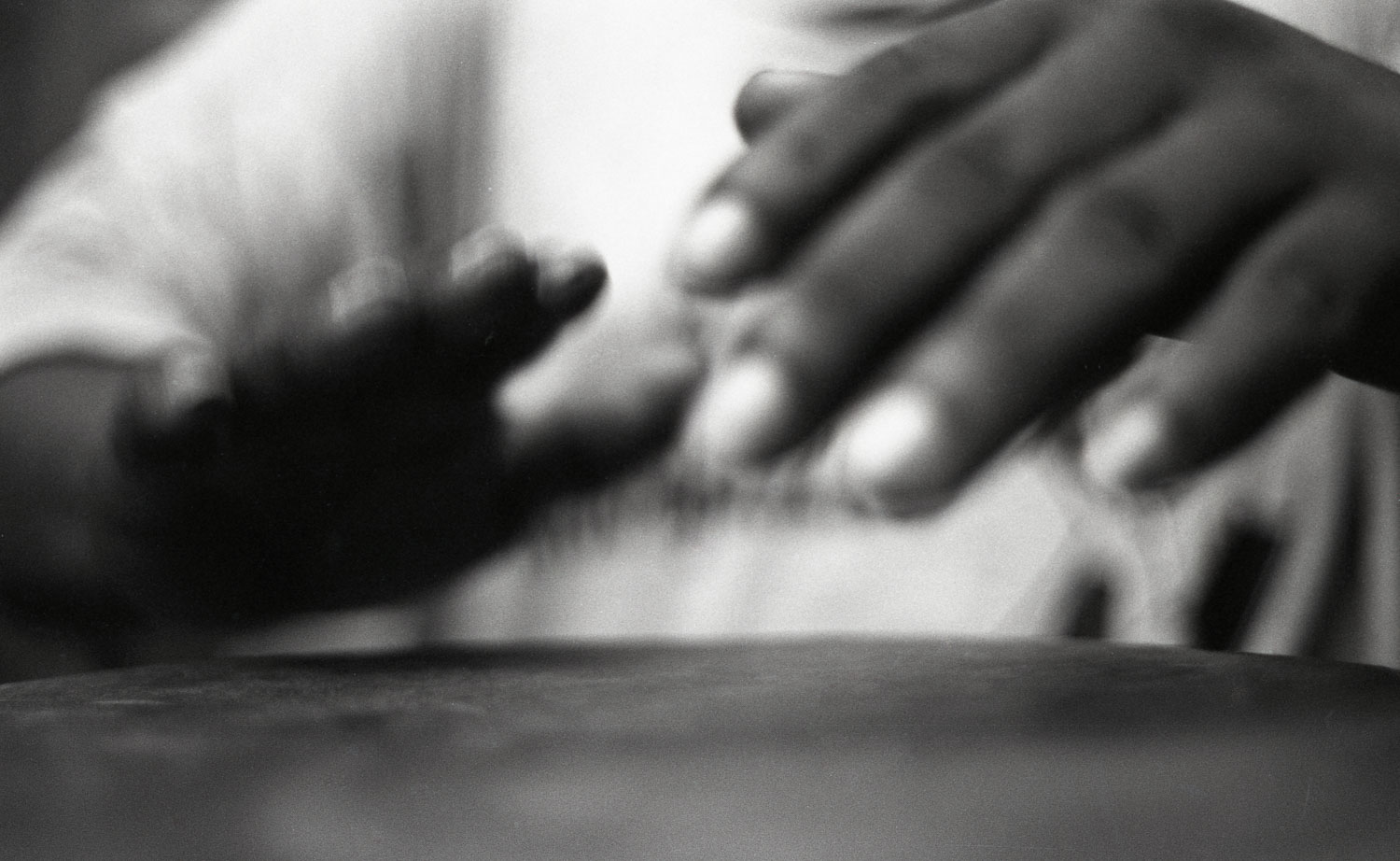 Show caption
Show caption
I met Eladio Reyes Arias at the Casa del Tango, doing standup: like the eskimo is said to have 30 words for snow, the Cuban has 50 for theft, was one of his jokes. He then listed them, from the hustler 'struggling' on the corner to ministerial misappropriation of funds. He was also a babalao, and invited me to this toque, at the solar where he lived.
Tumbadora
Drummer at toque de santos, Cayo Hueso, Havana, 2000
Dancing in the background are an Irish man from London and a Cuban woman. They'd go upstairs to do lines of coke and come back down and carry on drinking and partying. Enrique and Luisa who ran the place were our first friends and we became fixtures there. One friend even started to hustle other foreigners there and charge commission, just like Luisito the jinetero who first took us there. He was ridiculed for a time as his dealer had taken one of his leather deck shoes against a debt. I heard he'd got clean and was selling furniture in another part of town.
 Show caption
Show caption
Dancing in the background are an Irish man from London and a Cuban woman. They'd go upstairs to do lines of coke and come back down and carry on drinking and partying. Enrique and Luisa who ran the place were our first friends and we became fixtures there. One friend even started to hustle other foreigners there and charge commission, just like Luisito the jinetero who first took us there. He was ridiculed for a time as his dealer had taken one of his leather deck shoes against a debt. I heard he'd got clean and was selling furniture in another part of town.
Girls I
Claudia and Maria-Luisa in Claudia's parents paladar, or home-restaurant.
I lived with Enrique and Luisa for a month when I went back to Havana in 2006. These wild days were long gone then, all the hustle and underworld gone from Barrio Colon, the old red light district. Their restaurant was closed and all the messages written on the walls from Special Period customers painted over. I heard they'd won the emigration lottery an moved to Miami.
 Show caption
Show caption
I lived with Enrique and Luisa for a month when I went back to Havana in 2006. These wild days were long gone then, all the hustle and underworld gone from Barrio Colon, the old red light district. Their restaurant was closed and all the messages written on the walls from Special Period customers painted over. I heard they'd won the emigration lottery an moved to Miami.
Girls II
Claudia and Maria-Luisa in Claudia's parents paladar, or home-restaurant.
Looking back at these images now is like remembering myself as someone else. I'm still in touch with friends I made then, many of whom are no longer in Cuba. I hope to go back with my family. I met a Lebanese-Cuban medical student there in 2006 who planted the seed of an idea to travel to Lebanon in my mind. My dad was in Beirut in 1974, and he looks like me, or I him. I went and now I'm married to it.
 Show caption
Show caption
Looking back at these images now is like remembering myself as someone else. I'm still in touch with friends I made then, many of whom are no longer in Cuba. I hope to go back with my family. I met a Lebanese-Cuban medical student there in 2006 who planted the seed of an idea to travel to Lebanon in my mind. My dad was in Beirut in 1974, and he looks like me, or I him. I went and now I'm married to it.
Father and Son
Home made kite flying, Malecon







